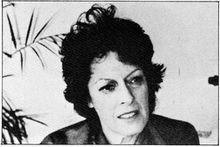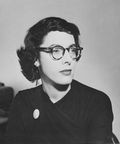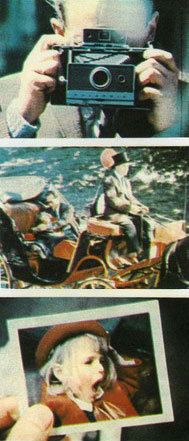Comments of DDB's Copy Chief
"Advertising Age" July 15,1968
interviewer: John Revett
Mrs. Phyllis Robinson was named to the New York Advertising Writer's Hall of Fame on May 29.
Q What was your interest in advertising to begin with? Was it in writing. or sales? Was there a glamor interest?
 Mrs.Robinson Not glamor, particularly. My primary interest was writing.
Mrs.Robinson Not glamor, particularly. My primary interest was writing.
Q Was that your educational back ground?
Mrs.Robinson No, I was a sociology major at college(Barnard) and never studied any advertising; at all.
You know, you look back and wonder how you ever got into this thing.
I can remember that as a kid I was influenced just by the vitality of some of the retail store advertising that was going on.
I can remember telling one of my favorite teachers in school that I wanted to be an advertising writer. But then, I guess it was history that changed things and I developed a little political and social awareness.
Things were falling apart in Europe and I had a feeling I should do something a little
more serious; I wound up actually as a sociology major, and then went into public housing work for the government.
And I remember I didn't want to take any writing courses; I had this cockeyed notion that I was some kind of writer and I didn't want anybody to touch it. It was like it was something very precious and I didn't want anybody to twist my wrist make me go in a certain direction, which is dumb because it's great to have to turn out a piece every day, the way you would in a writing course.
Q What educational background do you think is best for a copywriter?
Mrs.Robinson I don't think it matters. I guess a general education, but some of the best writers we've had have had no college education. On the other hand, Bill Bernbach studied advertising and marketing at NYU, so I don't think it matters.
Q. Where did you get your start as a copywriter?
Mrs.Robinson My first job strictly copywriting was for the Methodist Publishing Co. in Nashville.
What happened was that during World War II (and now I've dated myself, but I go back to the beginning of Doyle Dane Bernbach, anyway-20 years ago this October-so I won't worry about time) my husband was drafted, pulled out of Harvard, and I tried to get public housing jobs, or something related to it, as I followed him around on his southern tour.
But I couldn't, so I just got work wherever I could. At that point I was beginning to get back to the idea of some kind -of writing- advertising or promotion.
So I landed at a publishing house where I wrote advertising in publications that went to ministers-ads for Christ calendars, pictures of the Lord and children's Bible stories.
At first, I had applied at a local department store, but they didn't have anything.
Q. What were you paid to start as a copywriter?
Mrs.Robinson I don't know what I was paid theresomething ridiculous. I can remember pretty well what I was paid at Grey (her second agency job; the first was with Bresnick & Solomont, Boston, while her husband completed college). In those days we talked about it by the week.
I think I made $130 a week with Grey.
Q Was there any particular difficulty for a woman?
Mrs.Robinson I've never encountered any difficulty.
None at all.
Q Did you have an early copy chief or other supervisor who exerted a strong influence?
Mrs.Robinson There were two people, one almost a casual one, but he was very good. The guy--- I haven't seen him in a thousand years---who ran a funny little giveaway publication alled Park East; it wasn't the later, fancier one.
His name was Bob Altshuler, I think, and he ran this little slick and I talked myself into a job while I was still at college, I created a column, an inquiring telphone girl or something, and I wrote some yerse---made up the job. Altshuler told me---I don't know what his words were, but it was something like, "cut out all that stuff"---and I just knew what he meant.
He meant that I should cut but the prtentiousness and get to the point. I think it was just the shock of somebody saying that to me that helped me a lot, right away, very fast.
I don't think anybody had ever criticized my writing before.
The person who did more of the same was Bill Bernbach.
Bill was at Grey when I was there and I worked directly under him and he did a lot, really, in two directions, to tighten up my writing and make it move more, make it more vivid.
I guess when you're good enough, yourself, and you have a good enough teacher, you don't have to have anybody over you, changing and doing and so forth. Well, I somehow responded to this and seemed to turn out stuff that he liked very much, enough so that he invited me to come over when he started the agency.
Q Did you and Mr. Bernbach sit down somewhere and talk about this?
Mrs.Robinson Oh hell, no. He knew my work. He almost went without a writer, at all, without a copy chief, but he confided in me that he was starting an agency and said, "How'd you like to come along?"
It sounded very exciting and I didn't have any career at stake; I was still very much a
beginner, and so I thought that if he wanted me I was good enough to do it, and I thought it would be fun.
Q When Doyle Dane got started, one of the aims was to break through convention and do things that were new and different. How did advertisers take to this new approach?
Mrs.Robinson It was a wide open field and nobody was doing work like that. We were able to grow just from clients who were excited by work we did for other clients.
People who were interested would come in saying,
"We want this, we want some of that stuff." Of course, as Bill has pointed out many times, there was always a funny little lag once a client came in and we actually presented something bold and shocking with his name on it.
L; 1954
R; 1955
Q. Any examples?
Mrs.Robinson That was a long time ago. Ohrbach's came from Grey, so they knew what to expect and wanted more of it.
The headline I remember was probably the first spoof on advertising, first I was aware of, anyway: "Bring in your wife and for a few dollars we'll give you a new woman."
Of course, this has become almost a cliche now---funny advertising, the spoof of other advertising.
Q. What do you think about humor in advertising today?
Mrs.Robinson I think it's terrific when skillful and ghastly when it isn't. When it isn't, somehow
it's more offensive than just the dull straight commercial.
I know, I made a crack about radio advertising (in her Hall of Fame acceptance speech) and how an ad I did (for "Wevy's cimmamum waisin bwead") started a trend, but there's so much awful stuff on the radio now that's supposed to be funny.
This is true of television and print, too, but I think the worst of it seems to show up in
radio. I don't know why this is. I guess it could be that at some of the agencies
someone who thinks he can write funny is told, "Okay, write funny on this account."
This can be so heavy-handed. But when it's good it's great. You've got the consumer
laughing with you and loving you and learning about your product all at once.
Q. How do you feel about newer agencies such as Wells, Rich, Greene?
Mrs.Robinson Oh, I feel like--- an old grandmother.
I've got all these offspring all over the place.
There are a lot of talented people in the business now, but an awful lot of them started here and they're clearly under our influence, and acknowledge it.
I'm not saying anything that Mary Wells or Julian Koenig wouldn't say. They've said so to
me; they know what they owe us . . .
That doesn't mean they don't have their own way of doing things, too.
Q. How did you feel about style and discipline when iou were the DDB copy chief? Was there a particular DDB sound or characteristic that you looked for?
Mrs.Robinson Except for the fact that the work should be fresh and on the button, to the point, and do the work, the selling job, I definitely didn't look for a DDB style.
I think my oWn personal style is a very colloquial one, and this was picked up to a certain extent, or maybe I pulled it out of other people; the thing I prided myself on in those years was bringing out the best 'in other people. We didn't want to make little carbon copies of us.
To say don't do it like this, do it like me, I think is deadly. But to say to someone,
I don't think this is right because such, and such and to turn it back and say look back in side yourseif and find the answer---that helps a person grow and gets a better job right away. To have them search themselves for the answer, that's the way you get people to develop their own schtick, their own style.
Q. How did you feel about style and discipline when you were the DDB copy chief? Was there a particular DDB sound or characteristic that you looked for?
Mrs.Robinson Except for the fact that the work should be fresh and on the button, to the point, and do the work, the selling job, I definitely didn't look for a DDB style.
I think my own personal style is a very colloquial one, and this was picked up to a certain extent, or maybe I pulled it out of other people; the thing I prided myself on in those years was bringing out the best in other people. We didn't want to make little carbon copies of us.
To say don't do it like this, do it like me, I think is deadly. But to say to someone, I don't think this is right because such, and such and to turn it back and say look back in side yourseif and find the answer---that helps a person grow and gets a better job right away. To have them search themselves for the answer, that's the way you get people to develop their own schtick, their own style.
Q. Were you a tough copy chief?
Mrs.Robinson I think I was tough. I think probably if you asked around you'd get some kind of image like the iron fist in the velvet glove.
I always maintained very genial relations with my writers, happy ones, but I was very tough. I wouldn't pass something unless I thought it was really right, and I've turned things back 20 times.
Q. Do you think copy is too brief these days?
60 seconds. Under $60.
Mrs.Robinson I might have ten years ago. I think today the long, persuasive copy might be coming back in as a style, not that it was ever really out.
Q. Which is harder to write?
Mrs.Robinson Good copy is hard to write. If you're a good writer, you can write long copy or short. It's very difficult to write short copy well.
It takes some different skills to write a long piece of copy and sustain interest.
Q. Do you have any secret ways of getting the good-copy process started, for yourself?
Mrs.Robinson No, I write copy here, I write copy at home, in the bathtub, on the New Haven Railroad. Places aren't important to me, although I try to have regular working habits. But there are two general things I do that are very ingrained in me.
Who took the OOPS out of supermarket shopping?
Frozen food packages are wet. So are milk containers.
Load week's groceries on top of them and OOPS!
Grocery clerks sometimes try to solve this problem by doubling up on bags.
But two bags cost the grocer twice as much as one bag.
Olin has developed WaterBuff, a water-resistant bag that can carry a
load of soaking wet groceries for 45 minutes. That means one bag for the clerk to use.
One bag for the grocer to pay for. One bag that carries the groceries all the way home.
Another creative solution to a problem...from the Packaging Division of Olin.
One, I try to drench myself in the product or the story and then---just by free association just let go with any goofy thing about it.
The other is that if I ever---I've been lucky to have never had a writing block---if ever I can't get the hang of something or something seems to be stubborn, a little trick I have is just to get something on paper.
It always works for me; maybe it's because I have so much of the editor in, me I enjoy;
editing my own copy and I can hack it up even if I write something ghastly.
Other people I know don't do that at all.
They have something all polished in their mind first.
But I love to edit my own stuff.
Q. If you were still copy chief. what would you ask a copywriter applicant regarding attitude or philosophy about advertising?
Mrs.Robinson That's really not the way I ever approached writers. Generally, I would look at the work. because that what it's all about.
The people would have had some experience. We've had programs for people with no experiehce, and in that case we've set up sample things for them to do.
The work has always been the most important thing.
If I didn't see anything interesting enough in the book, I'd ask them to show: me the things that didn't get through.
Q. Do you think the young copywriter who comes' on strong has more difficulty gettfng hired. or should you look for a rebellious quaIity?
Mrs.Robinson A copy chief should look for good writers. If a good writer comes in a passive package, you just have to make sure that the passivity doesn't spill over into, his writing, and be reasonably sure that the would stand up for his ideas.
You can get brilliant, aggressive copy sometimes out of a passive, self-effacing person; on the other hand, boldness, aggressiveness is no guarantee that he'll project the excitement of his personality into his copy. If he's a good writer and you can tolerate him, you hire him and you play around, work with him, around him.
Q. What do you think has been the most important change or trend in advertising in the past ten years?
Mrs.Robinson The most sigificant is that creative people, generally, have become more aware that excitement can and should stem from the product.
Q. What in today's culture---such as books, films, television---is having the most influence on advertising?
Mrs.Robinson I think everybody's drawing on everything.
I think it used to happen less consciously.
But today we all use everything we experience, the stuff of our culture; we're going to use it consciously or unconsciously, and if it's used in a conscious way, I don't see anything wrong with it, unless it's used distastefully, of course.
Q. When are you going to start your own agency?
(Mrs. Robinson, who had said in her Hall of Fame acceptance speech that, incase anyone was wondering, she wasn't about to start her own agency, laughed before answering tpe last question.)
Mrs.Robinson I'm not about to start my own agency.
It's not that I don't love money; I'm crazy about it. But to start an agency you've got to have several things. You've got to have personal ambition, which I have, but a lot of that has been satisfied for me.
You have to want to really build something from scratch, and I participated in so much and so thorougWy that I've had that.
I've had that---know what I mean?
The end.

 An Interview with Mrs.Phyllis Robinson
An Interview with Mrs.Phyllis Robinson
(1) (2) (3) (4) (5) (6) (7) (8) (9)
>>Zoo commercial for Polaroid which is now in the Museum of Modern Art (MoMA) of film library.



